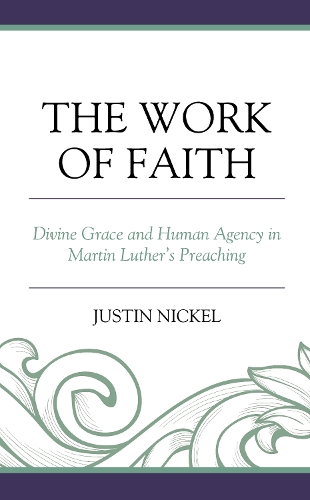
The Work of Faith: Divine Grace and Human Agency in Martin Luther's Preaching
(Hardback)
Publishing Details
The Work of Faith: Divine Grace and Human Agency in Martin Luther's Preaching
By (Author) Justin Nickel
Bloomsbury Publishing PLC
Lexington Books/Fortress Academic
31st August 2020
United States
Classifications
Professional and Scholarly
Non Fiction
Religious ethics
Semantics, discourse analysis, stylistics
Lutheran Churches
233.7
Physical Properties
Hardback
186
Width 164mm, Height 232mm, Spine 20mm
463g
Description
Many scholars assume that Luther advocates for a Christian life in which human beings are always passive recipients of Gods grace as it is delivered in preaching, and mere instruments through which God works to serve their neighbors. This book offers a different reading of Luthers views on human agency by drawing on a fresh source: Luthers preaching. Drawing on Luthers sermons in the Church Postil as a primary source, Justin Nickel argues that Martin Luther preached as though Christians have real, if secondary, agency in the lives they lead before God and neighbor. As a result, Nickel presents a Luther substantively concerned with how Christians lead their lives.
Reviews
Focusing on his oft-neglected sermons as key resources for understanding Martin Luther's theology, Justin Nickel persuasively challenges conventional claims that Luther sees human beings as purely passive recipients of divine agency. Instead Nickel identifies in Luther's sermons the "graced agency" of the pastor and hearers alike in being able to respond in word and deed to Christ's gift of righteousness. By shifting attention from Luther's academic writings to sermons aimed at parishioners concerned with how to live, Nickel allows us to see a Luther convinced that the relentless work of the Spirit cooperates with human agency and can lead to genuine growth in Christian love. A valuable contribution to Luther scholarship!--Deanna A. Thompson, St. Olaf College
It has always seemed odd that the Luther charged with breaking the church is also the Luther charged with encouraging passivity in the face of injustice. Perhaps we could make better sense of the great reformer if we listened to the way most in his day heard him: through his sermons. Justin Nickel rightly argues that expanding what we read of Luther expands how we understand Luther. Though he has been widely criticized for a passive conception of graced human agency, his preaching contradicts this misreading. The Work of Faith shows us Luther himself as an agent, a master of rhetoric who reaches out to minister to his congregants. Nickel shows that Luther calls Christians to intentional agency, even returning to the law in a manner transformed by love. Perhaps, he suggests, our problem with Luther is us: we tend to think of freedom as autonomy, but Luther thinks grace and freedom are not competitive, but compatible.--Jesse Couenhoven, Villanova University
Justin Nickel gives us a fresh interpretation of Luther's ethics by drawing on the way Luther himself did moral theology: through his preaching! With thoughtful and clear prose, Nickel complicates and innovates on standard readings of Luther, bringing to the fore Luther's ethical relevance for our own chaotic era. I highly recommend this book not only for theological ethicists and Luther scholars, but for pastors and anyone else concerned about moral formation.--Lois Malcolm, Luther Seminary
Author Bio
Justin Nickel is the Frances and Baxter Weant assistant professor of Lutheran Studies at Lutheran Theological Southern Seminary of Lenoir-Rhyne University.
